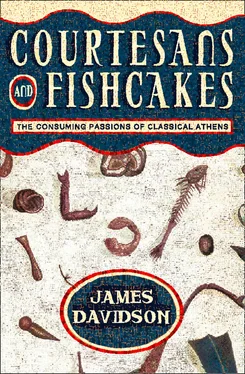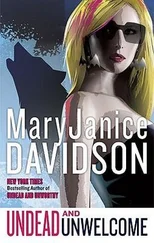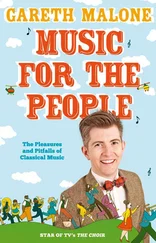For such ascetics, the use of opson to mean fish took on a rather different meaning. It was not so much a triumph as a naturalization of vice, a perversion of language as morally objectionable as when we use ‘drink’ – ‘I need a drink’ – ‘No! A real drink!’ – as a reference to alcohol or ‘smoke’ for ‘smoke cannabis’. To assume that when someone mentioned opson they were referring to some kind of seafood, the finest and most expensive of delicacies, must have seemed to Plato, who thought about these things, a quite enervated assumption. After having carefully removed fish from the category of opson when discussing golden age diet he was not going to allow it into his semantic field. 39 Конец ознакомительного фрагмента. Текст предоставлен ООО «ЛитРес». Прочитайте эту книгу целиком, купив полную легальную версию на ЛитРес. Безопасно оплатить книгу можно банковской картой Visa, MasterCard, Maestro, со счета мобильного телефона, с платежного терминала, в салоне МТС или Связной, через PayPal, WebMoney, Яндекс.Деньги, QIWI Кошелек, бонусными картами или другим удобным Вам способом.
Morality and usage were too closely connected. Ancient authors have long been suspected of being unreliable witnesses of the world they affect to describe. In some cases they are not better witnesses of the language they affect to describe it in.
The definition of opsophagia that Xenophon puts into the mouth of Socrates can now be seen for what it really is: not a straightforward discussion of meaning, but an attempt to impose one particular meaning and one particular method of finding meaning to the exclusion of others. It is extraordinary that in a discussion of the vice of opsophagia , fish, which had long before become the opsophagos ’ favourite food (no matter how he was defined), is never mentioned. Just afterwards the memorialist records another remark of Socrates: ‘In the Attic dialect,’ he used to say, ‘they call sumptuous banqueting “having a bite to eat.”’ 40 Конец ознакомительного фрагмента. Текст предоставлен ООО «ЛитРес». Прочитайте эту книгу целиком, купив полную легальную версию на ЛитРес. Безопасно оплатить книгу можно банковской картой Visa, MasterCard, Maestro, со счета мобильного телефона, с платежного терминала, в салоне МТС или Связной, через PayPal, WebMoney, Яндекс.Деньги, QIWI Кошелек, бонусными картами или другим удобным Вам способом.
Xenophon was not about to make the same mistake.
Socrates’ apparently idle question, directed obliquely at the young man he was trying to embarrass and redirected by Xenophon at us, has stimulated a whole range of answers down the centuries in the work of Plato, Plutarch, Athenaeus, Phrynichus ‘the Arab’, Pollux the lexicographer, and modern classicists such as Casaubon, Passow, Kalitsunakis and Liddell Scott and Jones. They do not agree with one another and the question cannot be described as settled even today. It seems a very dry debate, terribly pedantic and rather hard-going , exactly what a reader fears perhaps when she opens a book on classical Athens. Worst of all, it may seem irrelevant. Most people in classical Athens would have recognized the vice of opsophagia when they witnessed it, though the accused might have denied the charge or someone else might have disputed what exactly it was in this kind of eating that made the epithet applicable. In many cases there was nothing to debate about: ‘Another fish, proud of its great size, has Glaucus brought to these parts,’ says a character in Axionicus’ play The Euripides Fanatic , ‘some bread for opsophagoi .’ A big word, perhaps opsophagein meant different things to different groups of people, especially perhaps to different levels of society. Words do not have fixed and unitary meanings and it distorts one’s understanding of a text to treat them as if they do. If this is true today, it must have been even more true of classical Athens. In a world that was still free of the tyranny of dictionaries and public education systems, the meaning of words would have been generally quite slippery and quite difficult to tie down. 41 Конец ознакомительного фрагмента. Текст предоставлен ООО «ЛитРес». Прочитайте эту книгу целиком, купив полную легальную версию на ЛитРес. Безопасно оплатить книгу можно банковской картой Visa, MasterCard, Maestro, со счета мобильного телефона, с платежного терминала, в салоне МТС или Связной, через PayPal, WebMoney, Яндекс.Деньги, QIWI Кошелек, бонусными картами или другим удобным Вам способом.
I do not intend to devote too much space in the rest of this book, trying the reader’s patience with this kind of philology, but far from being dead or dry or irrelevant, this debate over words gives access to the very heart of Greek desires. Just as psychoanalysts can discover the key to traumas in a slip of the tongue, the fish conspicuously missing from the texts of Xenophon and Plato testify to the real danger that lay in appetites. Ancient texts do more than inform us about ancient desires. They do more than provide us with samples of the ancient discourse of desires. Ancient desire itself is in the text, repressed perhaps, but still present. In their hesitations and omissions our authors reveal a struggle in the very composition of their prose, an ongoing battle with dangerous passions that threaten all the time to consume them and their readers.
II DRINKING Contents COVER TITLE PAGE James Davidson COPYRIGHT PRAISE DEDICATION Dedication DEDICATION INTRODUCTION PART I. FEASTS I Eating II Drinking PART II . DESIRE III Women and Boys IV A Purchase on the Hetaera PART III . THE CITIZEN V Bodies VI Economies PART IV . THE CITY VII Politics and Society VIII Politics and Politicians IX Tyranny and Revolution CONCLUSION BIBLIOGRAPHY INDEX ACKNOWLEDGEMENTS ABOUT THE AUTHOR NOTES ABOUT THE PUBLISHER For D. A. D. and G. H. D . INTRODUCTION PART I. FEASTS I Eating II Drinking PART II . DESIRE III Women and Boys IV A Purchase on the Hetaera PART III . THE CITIZEN V Bodies VI Economies PART IV . THE CITY VII Politics and Society VIII Politics and Politicians IX Tyranny and Revolution CONCLUSION BIBLIOGRAPHY INDEX ACKNOWLEDGEMENTS ABOUT THE AUTHOR NOTES ABOUT THE PUBLISHER
not much like Brillat-Savarin’s Physiologie du Goût. Above all he objected to the brief entry for wine: ‘Noah the patriarch is regarded as the inventor of wine; it is a liqueur made from the fruit of the vine.’ If a man from the moon or a further planet, the poet notes sarcastically, were to land on Earth in need of some refreshment and turned to Brillat-Savarin, how could he fail to find all he needed to know ‘de tous les vins, de leurs différentes qualités, de leurs inconvénients, de leur puissance sur l’estomac et sur le cerveau’ . He offers as compensation his own gushing celebration of the properties of wine, an anecdote about a Spaniard and a prosopopoeia of the spirit of wine itself. As Roland Barthes pointed out in his introduction to the 1975 edition of the Physiologie , Baudelaire’s sarcasm reveals a fundamental conflict of views about the nature of wine: ‘For Baudelaire, wine is remembering and forgetting, joy and melancholy; it enables the subject to be transported outside himself … it is a path of deviance; in short, a drug.’ For Brillat-Savarin, on the other hand:
Читать дальше












